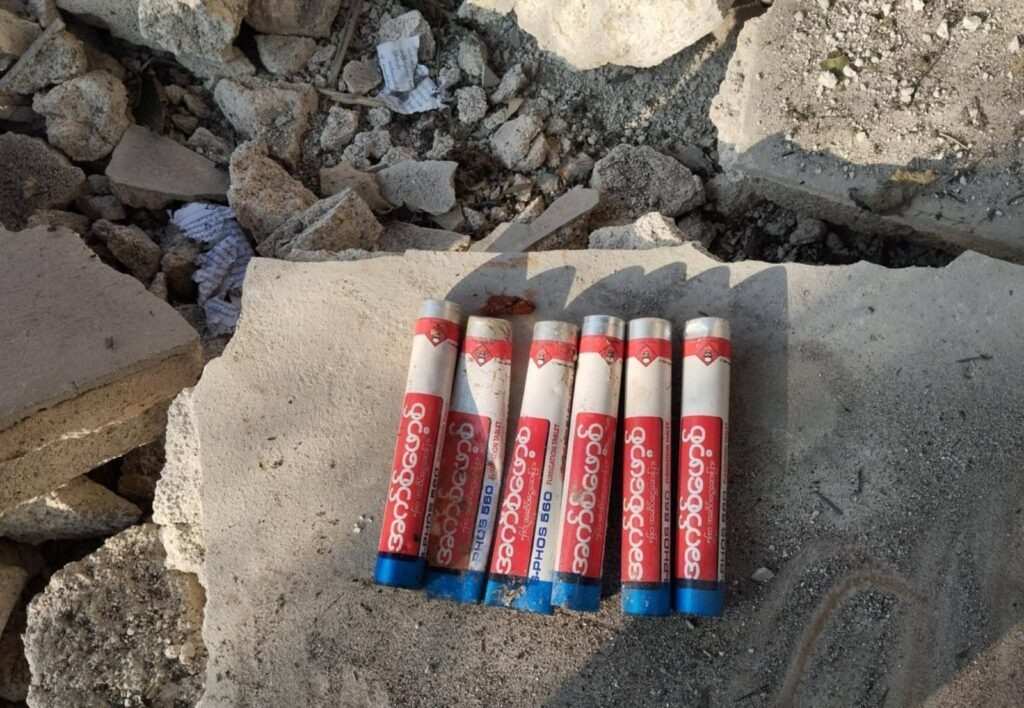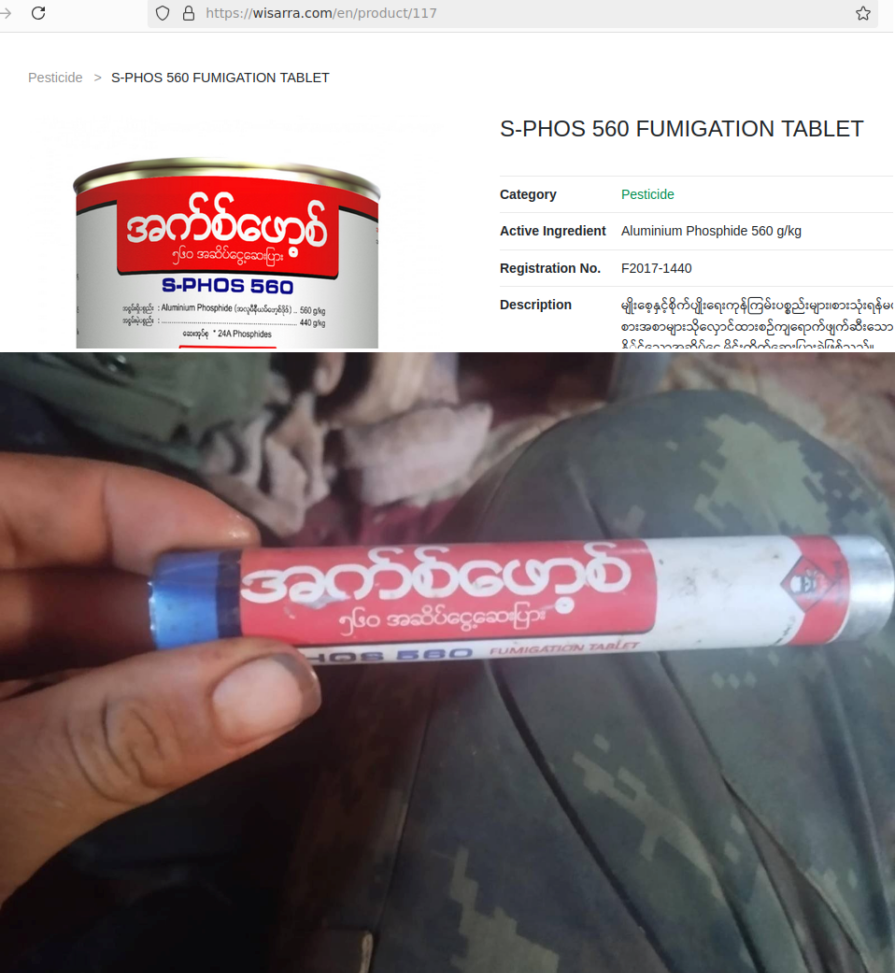Chemical Weapons Delivered by Burma Army Drone in Shan State
22 December 2024
Circumstances of the Chemical Weapons Use
On Dec. 7, 2024, in the Moe Bye area of southern Shan State near the border of Karenni State, the Burma military used aerial drones to disperse aluminum phosphide insecticide which caused several people to become sick with nausea and dizziness, as corroborated by an FBR medic on the ground. FBR reviewed photographs provided by the Karenni National Defense Force (KNDF) in relation to the Dec. 7 incident and found that the fumigation containers to be labeled in Burmese, suggesting the insecticide was manufactured domestically. Each container appears to be marked with the skull and crossbones insignia used in Burma to denote toxic material and bears the Latin script, “S-PHOS 560.”

Research of “S-PHOS 560” led to an agricultural chemical manufacturer in Yangon called Wi Sar Ra, which produces a product by that name, with the same label, containing aluminum phosphide 560g/kg. The canister depicted on the Wi Sar Ra site is a different container, but it is visually clear it is the same “S-PHOS 560” manufacturer and product.

Aluminum phosphide converts to phosphine gas when it comes into contact with moisture. It can take up to a few days for the phosphide in the tablet to fully exhaust in the form of phosphine. These characteristics make aluminum phosphide ideal for the military to deploy in low-lying spaces, as phosphine gas itself is heavier than air and is likely to linger and harm after the drone leaves the area.
Dropping insecticide from drones allows the Burma Army to terrorize people easily on the ground but also gives the military an opportunity to deny that it dropped the canisters. These insecticides are not closely-regulated chemical toxins delivered with distinct military systems, which gives the Burma Army some plausible deniability that it used chemical weapons.
Other Instances of the Burma Military’s Weaponization of Chemicals
There have been other recent instances where the Burma Army has reportedly weaponized chemical substances to harm life:
In November of 2023, in Lashio Township, Shan State, a bomb was dropped that caused “dizziness, breathlessness, nausea, extreme agitation, fatigue and low blood oxygen levels.”
In March of 2024, there were reports from southern Shan State of bombs being dropped that caused “oxygen depletion, fatigue, dizziness, rapid breathing and itching.”
In early 2024, Karenni troops in Hpasawng Township, Karenni State, experienced “shortness of breath, dizziness, and vomiting,” leading them to suspect the use of chemical weapons.
In early October, 2024, FBR volunteers witnessed people becoming ill after Burma Army munitions targeted our positions in Dooplaya District, Karen State.
Chemical Weapons under International Law
The use of toxic chemicals as weapons in conflict has been widely condemned and increasingly proscribed ever since chlorine, phosgene, and mustard gas were first used to devastating effect in World War I. Since its entry into force in 1997, the Chemical Weapons Convention has specifically prohibited the manufacture and use of chemical weapons. In addition to prohibiting the production and use of toxic chemicals that have no potential purpose other than as weapons, the Convention bans the weaponization and use in combat of “Schedule 3 Chemicals,” which include materials such as pesticides and other materials that “may be produced in large commercial quantities for purposes not prohibited,” such as for agriculture and manufacturing. The Government of Myanmar is one of the 193 states parties to the Chemical Weapons Convention, having originally signed the agreement in 1993 and later fully ratified its terms in 2015. As one of the 193 states parties to the Convention, Myanmar is bound to abide by its terms. Failure to do so could trigger investigation by the Organisation for the Prohibition of Chemical Weapons, the body responsible for implementing the Convention, and could provide grounds for other states parties to the Convention to undertake punitive measures against Myanmar.
In addition to being proscribed under the Chemical Weapons Convention, the use of toxic chemicals in combat is further prohibited as a matter of customary international humanitarian law, and can constitute a war crime as defined by the Rome Statute of the International Criminal Court “when committed as part of a plan or policy or as part of a large-scale commission” of crimes.
Please pray and help us call on the international community to take decisive action against the junta government and hold them accountable for these actions.
Thank you and God bless,
Free Burma Rangers
